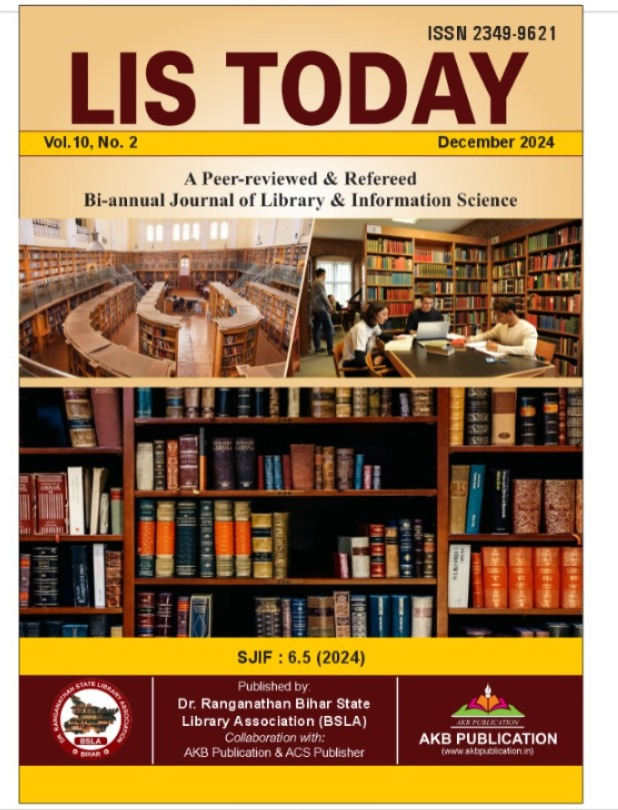Information Access and Resource Sharing with Persistent Identifiers
DOI:
https://doi.org/10.48165/lt.2024.10.2.3Keywords:
Archival Resource Key, Persistent Identifiers, Persistent Uniform Resource Locator, Digital Object Identifier, Data Repositories, InteroperabilityAbstract
Persistent identifiers (PIDs) are essential for information access and resource discovery in scientific journal management systems. It provides a unique and permanent reference identification number for digital objects, enabling researchers to locate access quickly and cite the data. The names of various persistent identifiers (PIDs) are Archival Resource Key (ARK), Digital Object Identifier (DOI), Handle System, and Persistent Uniform Resource Locator (PURL). This article deals with PIDs’ characteristics and power, enabling data sharing, collaboration, and advancing research. The paper also discusses PIDs’ benefits, applications, and future direction. Uses of persistent identifiers transform the impact of the research landscape.
References
Ahmadi, D., Lisnur, W., Nurrahman, A. A., Yanuarti, E., & Basude wa, M. I. (2023). Improving scientific literacy through man agement of electronic journal using the ‘open journal system.’ 050003. https://doi.org/10.1063/5.0158230
Ananthakrishnan, R., Chard, K., D’Arcy, M., Foster, I., Kesselman, C., McCollam, B., Pruyne, J., Rocca-Serra, P., Schuler, R., & Wagner, R. (2020). An open ecosystem for pervasive use of per sistent identifiers. Practice and Experience in Advanced Research Computing, 99–105. https://doi.org/10.1145/3311790.3396660
Bangert, D., & Frances, M. (2017). PIDs to support discovery and citation: Persistent identifier service design and delivery at li brary. 2017 ACM/IEEE Joint Conference on Digital Libraries (JCDL), 1–2. https://doi.org/10.1109/JCDL.2017.7991610
Brower, D., & Narlock, M. (2023). Persistent identifiers and research data. 2023 ACM/IEEE Joint Conference on Dig ital Libraries (JCDL), 269–270. https://doi.org/10.1109/
JCDL57899.2023.00055
Cook, R. B., Vannan, S. K. S., McMurry, B. F., Wright, D. M., Wei, Y., Boyer, A. G., & Kidder, J. H. (2016). Implementation of data citations and persistent identifiers at the ORNL DAAC. Ecological Informatics, 33, 10–16. https://doi.org/10.1016/j.
ecoinf.2016.03.003
Dappert, A., Farquhar, A., Kotarski, R., & Hewlett, K. (2017). Connecting the persistent identifier ecosystem: Building the technical and human infrastructure for open research. Data Science Journal, 16, 28. https://doi.org/10.5334/dsj-2017-028
Duerr, R. E., Downs, R. R., Tilmes, C., Barkstrom, B., Lenhardt, W. C., Glassy, J., Bermudez, L. E., & Slaughter, P. (2011). On the utility of identification schemes for digital earth science data: An assessment and recommendations. Earth Science Informat
ics, 4(3), 139. https://doi.org/10.1007/s12145-011-0083-6 Freire, N., Manguinhas, H., Isaac, A., & Charles, V. (2023). Per sistent identifier usage by cultural heritage institutions: A study on the European. Linking Theory and Practice of Dig ital Libraries, 14241, 341–348. Springer Nature Switzerland. https://doi.org/10.1007/978-3-031-43849-3_31
Gould, M. (2022). People, places, and things: Persistent identifiers in the scholarly communication landscape. College & Research Libraries News, 83(9). https://doi.org/10.5860/crln.83.9.398 Handle System: https://handle.net/
Holcombe, A. O. (2019). Contributor ship, not authorship: Use credit to indicate who did what. Publications, 7(3), 48. https:// doi.org/10.3390/publications7030048
Hoy, M. B. (2019). New tools for finding full-text articles faster: Kopernio, nomad, unpaywall, and more. Medical Reference Services Quarterly, 38(3), 287–292. https://doi.org/10.1080/02 763869.2019.1629215
John, K., Greg, J., & Joan, S. (2015, September 5). EZID: Easy iden tifier and metadata management. Proceedings of the Interna tional Conference on Dublin Core and Metadata Applications. https://doi.org/10.23106/DCMI.952137156
Klein, M., & Balakireva, L. (2020). On the persistence of persistent identifiers of the scholarly web. Digital Libraries for Open Knowledge, 12246, 102–115. Springer International Publish ing. https://doi.org/10.1007/978-3-030-54956-5_8
Koley, M., Namdeo, S. K., Suchiradipta, B., & Afifi, N. A. (2023). Dig ital platform for open and equitable sharing of scholarly knowl edge in India. Journal of Librarianship and Information Science, 55(2), 403–413. https://doi.org/10.1177/09610006221083678 Klump, J., & Huber, R. (2017). 20 years of persistent identifiers –
which systems are here to stay? Data Science Journal, 16, 09. https://doi.org/10.5334/dsj-2017-009
Mandal, P. S., & Mandal, S. (2024). APIs and SIPs for library and information services. Library Hi Tech News. https://doi. org/10.1108/LHTN-04-2024-0057
Meadows, A., Haak, L. L., & Brown, J. (2019). Persistent identifiers: The building blocks of the research information infrastruc ture. Insights the UKSG Journal, 32, 9. https://doi.org/10.1629/ uksg.457
ORCID: https://orcid.org/
The OBO Foundry Operations Committee Technical Working Group, Overton, J. A., Cuffaro, M., & Mungall, C. J. (2020). String of PURLs – frugal migration and maintenance of persistent identifiers. Data Science, 3(1), 3–13. https://doi.
org/10.3233/DS-190022
Plomp, E. (2020). Going digital: Persistent identifiers for research samples, resources and instruments. Data Science Journal, 19, 46. https://doi.org/10.5334/dsj-2020-046
Shim, M. H., Mok, C.-W., Chang, K. H.-J., Sung, J.-H., Choi, S.-J., Oh, S., Roh, C.-R., & Kim, J.-H. (2016). Clinical characteristics and outcome of cancer diagnosed during pregnancy. Obstet rics & Gynecology Science, 59(1), 1. https://doi.org/10.5468/ ogs.2016.59.1.1
Sicilia, M.-A., García-Barriocanal, E., Sánchez-Alonso, S., & Cuadrado, J.-J. (2019). Decentralized Persistent Identifi ers: A basic model for immutable handlers. Procedia Com puter Science, 146, 123–130. https://doi.org/10.1016/j. procs.2019.01.087
Spirin, O. M., Matviienko, O. V., Ivanova, S. M., Ovcharuk, O. V., Mintii, I. S., Ivaniuk, I. V., & Luparenko, L. A. (2021). The use of open electronic scientific and educational sys tems to support the professional activities of research and teaching staff of Ukrainian universities and scientific insti tutions. Digital Humanities Workshop, 169–176. https://doi. org/10.1145/3526242.3526261
Weigel, T., Kindermann, S., & Lautenschlager, M. (2014). Action able persistent identifier collections. Data Science Journal, 12(0), 191–206. https://doi.org/10.2481/dsj.12-058
Zenodo: https://zenodo.org/
Van De Sompel, H., Klein, M., & Jones, S. M. (2016). Per sistent URI must be used to be persistent. Proceedings of the 25th International Conference Companion on World Wide Web - WWW ’16 Companion, 119–120. https://doi. org/10.1145/2872518.2889352

